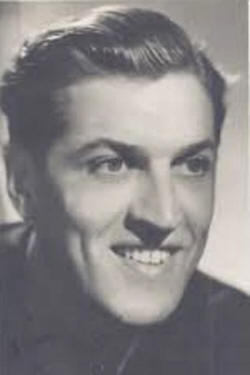

Queer Places:
33 Denbigh St, Pimlico, London SW1V 2HE, UK
 Thomas James Gill (26 July 1916 – 22 July 1971) was a British actor who was born in Newcastle upon Tyne, Northumberland, England.[1][2] He made his stage debut in 1935, and his theatre work included the original production of
Noël Coward's After the Ball at the Globe Theatre in 1954.[3][4]
Thomas James Gill (26 July 1916 – 22 July 1971) was a British actor who was born in Newcastle upon Tyne, Northumberland, England.[1][2] He made his stage debut in 1935, and his theatre work included the original production of
Noël Coward's After the Ball at the Globe Theatre in 1954.[3][4]
There were several high-profile arrests of homosexuals in wartime but there were also cover-ups, as described in 1989 by Richard Huggett in his acclaimed biography of Hugh ‘Binkie’ Beaumont. Binkie was the powerful and influential managing director of the theatrical production company H. M. Tennent, and in 1942 he saved a famous actor from public humiliation. In 1964 Huggett was cast in the film The Yellow Rolls-Royce, where he befriended the gay actor Tom Gill, who was also in the cast. Gill described for Huggett his wartime role in the cover-up which led to him acting as a scapegoat for the famous actor, and serving a prison sentence. Tom Gill was well known for playing breezy service and establishment types. He declared himself willing to go to prison for a year in exchange for £2,000 cash, £1,000 before and the other £1,000 afterwards, and the promise of permanent employment for the rest of his life. At the time of the arrest he was a serviceman and he was arrested with Angus McBean. Gill was described as a 25-year-old lieutenant in an Armoured Division. He was sentenced to 15 months’ imprisonment. Theodore Parker, aged 18, was sent to borstal for three years. Parker had been found in the possession of 36 letters written by Gill, letters which could be described as love letters. Adrian Woodhouse confirms that it was McBean who was also ‘sacrificed’ for the famous actor, the ‘second scapegoat’ unidentified by Richard Huggett. The identity of the famous actor, he says, was probably the bisexual Emlyn Williams.
My published books:/p>